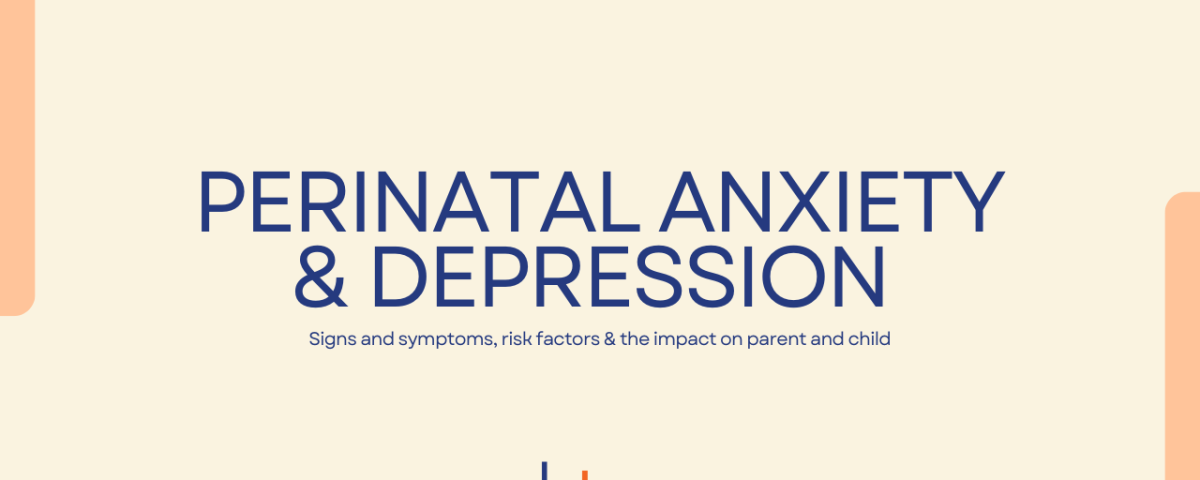Perinatal Anxiety & Depression Gold Coast
Perinatal anxiety and depression (PNAD) are prevalent mental health conditions affecting individuals during pregnancy and the first year postpartum. While the joy of welcoming a new baby often takes centre stage, many new parents on the Gold Coast grapple with overwhelming feelings of anxiety and sadness. This blog explores what PNAD is, its signs and symptoms, risk factors, impacts on both parent and child, and how to seek support and treatment on the Gold Coast.
What is Perinatal Anxiety and Depression?
PNAD encompasses a range of emotional disturbances that occur during the perinatal period, which includes pregnancy and the year following childbirth. While many associate postpartum depression solely with sadness, it is crucial to recognise that anxiety is a significant aspect of perinatal mental health on the Gold Coast.
Types of Perinatal Mental Health Issues
- Perinatal Depression: Characterised by persistent feelings of sadness, hopelessness, and a lack of interest or pleasure in activities.
- Perinatal Anxiety: Involves excessive worry, fear, or panic that can interfere with daily life, often manifesting as constant concerns about the baby’s health or wellbeing.
- Post-Traumatic Stress Disorder (PTSD): Some parents may experience PTSD after a traumatic birth experience.
Signs and Symptoms
Recognising the signs and symptoms of PNAD is crucial for early intervention. Common symptoms include:
Emotional Symptoms
- Persistent sadness or low mood
- Excessive worry or fear
- Irritability and frustration
- Feelings of guilt or inadequacy
- Difficulty bonding with the baby
Physical Symptoms
- Fatigue or insomnia
- Changes in appetite
- Physical tension or headaches
- Heart palpitations or panic attacks
Behavioural Symptoms
- Withdrawal from social activities or support systems
- Changes in the ability to care for the baby
- Increased reliance on substances like alcohol
If you or someone you know is experiencing these symptoms, it’s vital to seek help for PNAD on the Gold Coast.
Risk Factors
Several factors can increase the likelihood of developing PNAD:
- Previous Mental Health Issues: A history of depression or anxiety makes individuals more susceptible.
- Lack of Support: Insufficient support from partners, family, or friends can lead to feelings of isolation.
- Stressful Life Events: Major life changes, such as job loss, relationship issues, or financial stress, can trigger symptoms.
- Complications During Pregnancy or Birth: Health problems for the baby or the parent can heighten anxiety.
- Unplanned Pregnancy: Feeling unprepared for a baby can lead to overwhelming emotions.
Impact on Parent and Child
PNAD can have profound effects on both the parent and child:
Impact on the Parent
- Diminished Wellbeing: Persistent mental health issues can lead to chronic stress, impacting physical health.
- Difficulty Bonding: Parents may struggle to connect emotionally with their baby, leading to feelings of guilt and shame.
- Relationship Strain: Anxiety and depression can create tension in partnerships, affecting communication and intimacy.
Impact on the Child
- Developmental Delays: Children may experience delays in emotional, social, and cognitive development.
- Behavioural Issues: Research suggests that children of parents with untreated PNAD may exhibit increased anxiety or behavioural problems.
- Attachment Difficulties: A disrupted bond can lead to attachment issues, impacting the child’s emotional security.
Seeking Support and Treatment for PNAD on the Gold Coast
The good news is that PNAD is treatable. Here are steps you can take to seek support:
- Speak to Your Healthcare Provider
Your first step should be to discuss your feelings with your GP or midwife. They can provide an initial assessment and refer you to mental health professionals if necessary.
- Join Support Groups
Connecting with others who are experiencing similar challenges can provide emotional support and reduce feelings of isolation. Many organisations on the Gold Coast offer perinatal support groups, both in-person and online.
- Consider Therapy
Cognitive-behavioural therapy (CBT) has been shown to be effective for anxiety and depression. Other therapeutic approaches, such as interpersonal therapy, may also be beneficial for those dealing with PNAD.
- Medication
In some cases, medication may be necessary to manage symptoms. Discuss the risks and benefits with your healthcare provider, especially during pregnancy or breastfeeding.
- Self-Care Strategies
Incorporate self-care practices into your daily routine:
- Exercise: Physical activity can boost your mood and reduce anxiety.
- Mindfulness and Relaxation: Techniques such as meditation, yoga, or deep breathing can help manage stress.
- Healthy Nutrition: Eating a balanced diet supports overall wellbeing.
Take Action: Reach Out for Support
PNAD is a significant issue that deserves attention and understanding. By recognising the signs, understanding the risk factors, and seeking support, parents can find a path to healing. It’s essential to remember that you are not alone; many individuals experience these feelings, and help is available.
If you’re in need of support for PNAD on the Gold Coast, don’t hesitate to reach out to CBT Professionals. Our dedicated team is here to help you navigate the challenges of perinatal anxiety and depression.
Contact Us
For assistance, please contact CBT Professionals at:
- Helensvale: (07) 5551 0251
- Nerang: (07) 5668 3490
- Mount Gravatt: (07) 3102 1366
Your mental health matters—not just for you, but for your child as well. Take the first step towards healing today and let us support you on your journey with PNAD on the Gold Coast.
Disclaimer: Content on this website is provided for education and information purposes only and is not intended to replace advise from your doctor or registered health professional. Readers are urged to consult their registered practitioner for diagnosis and treatment for their medical concerns.
THREE CONVENIENT LOCATIONS
MOUNT GRAVATT
Mt Gravatt Medical PrecinctSE 105, 1808 Logan Rd
Upper Mount Gravatt QLD 4122


